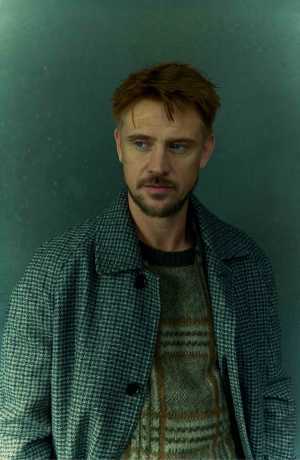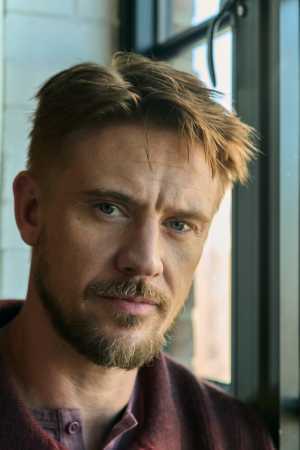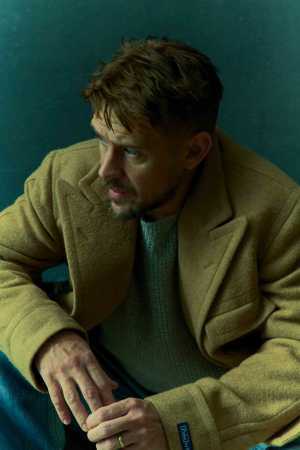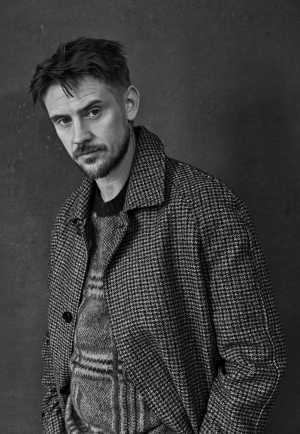Boyd Holbrook doesn’t wear a lot of black. He used to, says the actor, as he’s lived in New York “forever” and “that’s the kind of thing they do here”. These days, however, his wardrobe’s a little less moody – but every bit as monochrome. “I tend to wear this one white sweater,” Holbrook laughs, “and this one pair of white Carhartt pants. And I just love this whole white thing I’ve got going on. It’s almost the antithesis of how I used to dress.”
It’s also the antithesis of Johnny Cash, the hard-strumming, ever-humming ‘Man in Black’ who once explained his fashion choices as “a symbol of rebellion against a stagnant society”. Holbrook’s reasoning may be a little less lyrical, but the Cash comparison stands – for we’ll soon see the actor embody the singer-songwriter in new Timothée Chalamet-starring Bob Dylan biopic, A Complete Unknown.
“It was nice, in a way, to embrace the black,” Holbrook says of Cash’s darker duds; the sunglasses, the chunky knits, the heavy leather waistcoats. These came courtesy of Arianne Phillips, the same costume designer who dressed Joaquin Phoenix’s acclaimed Cash in 2005’s Walk the Line. The director of that film, James Mangold, also co-wrote, directed and produced A Complete Unknown. Even the cinematographer is the same.
The band, then, is back together – and Holbrook couldn’t be in safer hands. Which is a good thing because, as the actor himself admits, there’s not much of a resemblance between him and Cash. “But who looks like anybody?” he shrugs. “I had to wear contact lenses, we did a slight prosthetic nose, and I probably shed about 25lb to try to get to that version of Johnny, in his more fast-living days.”
It’s a tremendous transformation. Because the Holbrook here in New York has very blonde hair, very blue eyes and had never once dabbled in the musical arts. And yet, if you dig a little deeper, look a little closer, it’s easy to see why he was earmarked for the rock’n’roll role. He was born in a small valley in Kentucky; Cash around 500 miles away, two states over, in Arkansas. Both men stand, almost eerily, at the same, semi-imposing 6ft 1.5in. And both clearly hold a well-pitched place in James Mangold’s heart.
Leo Jacob
Leo Jacob
“I don’t think I would have done it unless it was Jim doing it,” says Holbrook. “Pretty plain and simple. Because Jim knows this world so well – and he’s not going to let anything be mediocre. As you’ll see in the film, Bob and Johnny were pen pals, and Johnny was the one who reached out to Bob because he was such a fan of his brilliance. I have that with Jim. He’s a dear friend, an artist and someone who I deeply admire.”
Mangold has made a marvellous film, and Holbrook a marvellous Cash. His is a different portrayal from Phoenix’s, a slightly more freewheeling, free-spirited spin that – liberated from the lead-character constraints of Walk the Line – isn’t as mired in his own mythology. Instead, this is a fresher, untethered take, one that gives Holbrook the chance to have some fun.
He briefly appears in the film’s trailer, but those few seconds are by far the most replayed on YouTube, and although nobody could steal the film from Chalamet, Holbrook’s scenes stick strongly in the mind. Mangold has steered the actor right several times before. The pair’s first collaboration was 2017’s seminal Logan, a stark superhero film which pitted a robotic-handed Holbrook against Hugh Jackman’s aged and ailing Wolverine. (As the credits rolled, Johnny Cash croaked the film to its critically adored close.)
Reviews described Holbrook’s villain as “snide,” “sinister” and the film’s “smirking sadist-in-chief”. Many also characterised Logan as a western of sorts – one of the actor’s most-frequented genres. Holbrook played opposite Natalie Portman in Jane Got a Gun, and starred as real-life frontiersman William ‘Cap’ Hatfield in a History Channel miniseries. He’s always been drawn to such stories, he says, populated with strong-and-silent, right-and-wrong kinds of characters.
“Because I grew up around lots of those people,” says Holbrook, “in rural Appalachia, which is like eastern Kentucky, western Virginia areas. It’s real pioneering people, because to live there is no easy task. It’s one of the most secluded places in the country – but also one of the most beautiful, in my opinion. Go back to these places we call ‘hollers’, and you’ll find just the most fascinating people. They’re so isolated, they’re not rubbing up against any social norms. Where I come from, the people I grew up with were all blue-collar. Maybe, in a town of 3,000, there’d be 100 people who were doctors or lawyers or stuff like that. So that’s just what I know best, those types of people.”

Coat: All Saints | Sweater: Nn007 | Trousers: All Saints
Perhaps this is why, like his wardrobe, Holbrook’s cinematic repertoire is mostly black-and-white. He’s played good – army rangers, special agents, even the odd superhero – and he’s played bad – in Logan, yes, but also in the second of his three collaborations with Mangold: Indiana Jones and the Dial of Destiny. “When he called about Indiana Jones, I was like: you know what, Jim? I love working with you. So sure. And it just went fantastically. I had one of the greatest experiences of my life making that movie. It was a fun character, and I got to work in five different countries during Covid.”
In the fifth and final instalment of the Harrison Ford-starring franchise, Holbrook played Klaber, a CIA-affiliated assassin and Alabama-born neo-Nazi. He’s the trimly moustachioed, sharply suited henchman of Mads Mikkelsen’s pursed villain. But his character wasn’t always as cleanly cut, and originally more closely resembled The Godfather’s John Cazale.
“I had that whole thing,” says the actor. “The really long, shaggy hair, the receding hairline, a straggly, creepy look. And it was really cool, but it wasn’t it. So we went more in the military, 1950s, crop-top direction. And boom! That was it. But that’s always been the process with Jim,” he adds. “You can talk about it until the cows come home. But, until you see it…”
Holbrook was a carpenter before he became an actor. And, one night while filming Indiana Jones, he went to dinner with Harrison Ford. “He kind of just lit up,” says Holbrook of the moment he revealed their shared past vocation. “It was a night towards the end of the job, and he wanted to hear my story. Of course, I already knew his story, and I wasn’t about to lie about mine. I just knew it was kind of similar. But I’d grown up watching Robin Williams, Jim Carrey, In Living Color, Def Poetry Jam – all these performances. I didn’t go to theatre school or anything like that. I had no idea how to become an actor, because there was absolutely nothing like that around me.”
The first time Holbrook thought about being an actor, he was 16 and had just watched Saul Williams play a poet in 1998’s Slam. “An amazing movie,” he says. “And, when I saw it, I thought: ‘Wow, I can do that.’ I didn’t know how to do that, but I knew that I could do that.” The second time Holbrook seriously toyed with the idea of becoming an actor, he was working in a department store in Lexington, and bumped into fellow Kentucky-born actor, Michael Shannon.
“I recognised him from Vanilla Sky,” says Holbrook, “and I sort of naively went to him: “How do you become an actor, man?” He said: “Get into theatre.” So I called my sister, who knew the lighting director at a local theatre, and she got me a job. I worked the lights and built the sets. And that taught me that this group of people is way more than those you see on the stage. It gave me a way deeper appreciation for the whole scheme of stuff, and I saw that this was my tribe of people. I knew that I didn’t fit in a whole lot of places, but I fit in there. Eventually, I got to New York, and I clawed and scratched my way to here.”

Sweater and long-sleeved shirt: Vince
The key change of Holbrook’s career came in 2014, when he was cast alongside Pedro Pascal as co-lead of new Netflix drug drama Narcos. “I still don’t know how I got that fuckin’ job,” Holbrook laughs. The influential show, one of the first few Netflix originals, helped break the dam that was holding back a new age of streaming. But the actor says it didn’t feel revolutionary at the time. “It’s really bizarre, actually,” he smiles, “how these things kind of catch fire”. He returned to the small screen in 2020, when he led a remake of The Fugitive for the short-lived, short-form streaming platform Quibi. Each episode was around eight minutes long, and promised to, once again, revolutionise television. It did not.
“That was a bit of a gamble,” Holbrook winces. “They offered me some money, and I’d just had my first kid, and they said that this network was going to take off; that it was going to be cool. But we had to shoot the thing in like 20 days. So, yeah, it was probably just cash-grabbing.” It is, however, another Harrison Ford parallel – with Ford topping the bill in the 1993 film version of The Fugitive. Did Holbrook bring this coincidence up at dinner? “We definitely did not talk about it,” laughs the actor, “I just let that one slide beneath the rug.”
Ford is an inspiration, Holbrook says, but not necessarily a mentor. Yet, just as Johnny Cash could always rely on the steady strums of his backing band – the Tennessee Three – to keep him right, Holbrook credits a specific trio of actors with shaping him into the performer he is today: Shea Whigham, Christian Bale and Michael Shannon.
“Shea is a big mentor to me,” Holbrook explains. “He was in a short film of mine [2015’s Peacock Killer] and he’s just a fantastic actor. He’s like a jazz actor. Christian is why I love to do such diverse things, because he and his work have this versatility and range. We did a movie together called Out of the Furnace and, while we were on that, he offered me to come onto a Terrence Malik film. I eventually got cut from that, but that’s just the kind of guy Christian is. Not a lot of people know how cool he is. I don’t really even know him myself, but what I do know of him is great.”
Michael Shannon, too, has been something of a north star for Holbrook since that chance encounter in a Lexington department store. (The name of the store in which Holbrook’s new life began? Lazarus & Company.) Earlier this year, the pair even shared a screen in The Bikeriders. “For the first time, I felt weird,” Holbrook says, hand fluttering. “I was like, oh God, I’m nervous. Do I know my lines? But he’s a great actor. Wow, I mean, he can do anything.”
Holbrook played a former Hells Angel in The Bikeriders, which also starred Austin Butler and Tom Hardy. Sitting between Indiana Jones and A Complete Unknown, it bundles his last three films – all set in the 1960s – into a loose trilogy. “There were a lot of good things coming out of the 1960s,” says the actor of the era. “Dylan, Cash, all of those guys. You see cultures developing to a certain status, and producing voices on a more and more radical scale. Even with The Bikeriders, you see it growing. There’s just something about the human race back then, they just kept upping the ante.”

But Holbrook considers the best decade for his chosen medium, film, to be the 1970s. He cites Easy Rider, Five Easy Pieces and almost anything by John Cassavetes as the gold cinematic standard, and laments that artists can no longer live “for $90 a month” in New York City, making films on the fly from ever-changing, often improvised scripts. “It’s kind of been lost,” he says of this off-the-cuff style of filmmaking, “and I’m not here to cry about it, but there is some bittersweetness. I wish I could have been around for that. That would have been incredible.”
Even Johnny Cash flirted with this spur-of-the-moment, Wild West-way of filmmaking – starring opposite Kirk Douglas in 1971’s A Gunfight. But the songwriter was never constrained by medium or genre, and commonly flitted between musical styles including country, gospel, bluegrass, rockabilly and folk. Holbrook’s back catalogue is just as diverse. The actor led the latest film in the sci-fi Predator franchise, played a werewolf killer in period horror Eight for Silver, and even recently dabbled with comedy in 2022 mystery Vengeance.
“Vengeance was so much fun,” says Holbrook. “I hadn’t really gotten to do a comedy yet, and B.J. [Novak] let me cut my teeth on that and figure it out. I was actually just talking about diversity, because I did The Sandman season two this year, but also The Morning Show – two shows that couldn’t be more different.”
In The Sandman on Netflix, Holbrook plays The Corinthian, an anthropomorphic nightmare with two jagged-toothed smiles in place of his eyes. (It’s even freakier than it sounds.) The Morning Show, on the other hand, is a newsroom drama on Apple TV+ starring Jennifer Aniston and Reese Witherspoon. Holbrook will play a podcaster: “a mash-up of all those 100 million-subscriber guys with zero editorial oversight. He just says what he wants and goes on all these tears. It’s really fun, man.
“Sometimes I prefer it when a character has like a really specific identity,” he adds. “Because then it’s like, OK, this whole song is in the key of E – so you’ll know when you’re out of step. Other times, when you’re more yourself, or the ‘raw me’, that’s more challenging. There’s no accent or anything. So I prefer the ‘mask work’ – when you put on a mask and it gives you the freedom to do whatever you want.”

Coat: Polo Ralph Lauren | Sweater: James Perse | Jeans: Our Legacy
There are a fair few masks lined up. Among Holbrook’s upcoming projects are Cloud One, a sci-fi thriller based on a short story published in Playboy in 2015, and Last Meals, in which the actor plays a maximum-security prison inmate on a hunger strike. It’s a role that will see him reunite with Mads Mikkelsen. “You know,” Holbrook says, “me and Mads just got along so well, and I think he’s so amazing. So that finally feels as though it’s going to happen. It’s somewhere down the road, at least, this really beautiful prison drama.”
First, though, comes Cash. Releasing ahead of awards season, Holbrook can be seen in A Complete Unknown alongside Edward Norton as Pete Seeger, Monica Barbaro as Joan Baez and, of course, Chalamet’s electric Bob Dylan. “I probably had the deeper fascination with Dylan, actually,” says Holbrook, “because of his lyrics and stuff. But, over the time of figuring out Johnny, studying him, mimicking him and trying to capture his essence, I discovered so many treasure troves. You know, my dad was a huge Johnny Cash fan, still is. Cash had this song about stealing car parts from a factory he works in, and he goes home and starts building a car from the stolen parts. It’s amazing. And my dad worked in a factory like that.”
Holbrook references his father, Don, several times during our interview. There’s his hobby of tuning up cars and motorcycles, or that time he rode from Kentucky to Florida looking for adventure. The stories are steeped in admiration, with a reverence otherwise reserved for his acting heroes. They are also, one would presume, the sort of fanciful, folkloric legends every father wishes their son would spin about them. Holbrook himself has just doubled the chance he’ll be the subject of such stories: ten days ago, he and his wife, Danish actress and artist, Tatiana Pajkovic, welcomed their second child.
“We’re all over the place,” laughs the actor. “Although the second one’s actually kind of really easy compared to the first. The first one’s the shocker. At that time, I was like: my life is not set up for this, at all!
“I actually did a movie for my son, a kid’s movie with Pedro [Pascal] called We Can Be Heroes. I’d just had my kid, and Robert Rodriguez was doing it, and he’s a legend. Before, I might have been too pretentious to do something like that. But, on a more practical level, sometimes you’ve got to take what you can take. We can’t all have these curated careers. It just doesn’t work out that way. My kid came to it recently, and he watched it for like a year straight.”
Holbrook’s son also cashed in on the Cash prep, and enjoyed singing the songwriter’s tunes with his father. But, with Cash’s back catalogue comprising more than 1,500 recordings, which tracks became Holbrook family favourites? “‘Big River’, for sure, is the prettiest lyrical song,” says the actor. “After that, I would probably say ‘A Boy Named Sue’. That’s the funniest damn song in the world. Me and my son sing that. It’s amazing. There are so many – ‘Ballad of a Teenage Queen’ is a good one. And I’m only in the Bs!”

Holbrook only recorded two songs for the film: ‘Folsom Prison Blues’ and ‘Big River’. But, while his may just be a supporting role, Holbrook’s contribution to the film’s success shouldn’t be understated. His Cash is Dylan’s guardian in some respects, and his enabler in others. He’s the character you’d most like to go for a beer with – all playful, troublemaking asides and tipsy aphorisms. His playing, too, is the most engaging of all the actors on screen. Guitar held high on his chest, eyes trained down the fretboard like a rifle, Holbrook’s Cash fires rough after ready chord into the crowd. His rhythms chug on like a runaway train – but he always keeps his cool.
“As soon as I found out I was playing Johnny,” says Holbrook, “I asked them to send me the guitar, the same size that I would be playing. Then I rehearsed with, really, much more talented people than me. I worked with an acting coach who kept me from going down rabbit holes, a dialect coach who kind of opened up my frame so I could talk with Cash’s resonance, a singing coach, a guitar coach, and a movement coach to get his hollow kind of sound.”
Originally, Holbrook was given just over a month to learn the two tunes. But then the Screen Actors Guild strike hit Hollywood last summer, and he was gifted an extra stretch of rehearsal time. “That was a bit of a blessing,” he nods, “because I still couldn’t really play and sing at the same time. I was like any other guy out there with a guitar – I could play a few chords, maybe, but now I can count music, I can sing while playing. And that was never in my wheelhouse before.”
For those familiar with Holbrook’s wider work, this may come as a surprise. For, in the past, the actor has released poetry collections, worked with influential fashion photographers and even exhibited his own sculptures at art shows. But A Complete Unknown was Boyd Holbrook’s introduction to the musical arts. One of his earliest films, Higher Ground, may have seen him play an angsty teen rocker, but Holbrook admits that performance was mostly lip-syncing and “half-hitting a couple of chords for a few frames”.
“But the cool thing about this gig, I think” he says of acting, “is that it’s like coming down to a fight. It’s like: this is going to happen, no matter what, and either you’re ready – or you’re not. There’s nothing like that intensity. For me, you’ve just gotta show up. A week before filming, you know, they told me that I’d been singing at 100 speed, but Cash’s recordings were at 116 speed, so that’s what I’d have to do on the day.”
Holbrook buckled down, pulled himself up by those black leather bootstraps and delivered as fine a performance as Joaquin Phoenix did two whole decades ago – not to mention a show that goes toe-to-tapping-toe with Chalamet’s own extraordinary efforts. But Holbrook isn’t measuring himself against other actors. He’s not even comparing himself to Cash. Instead, he’s happy if he’s trying something new – and offering a new take on a classic.
“Because everything’s an inspiration and a reinterpretation of something else,” says the actor, tracing a circle with his finger. “A homage, too. So I knew this was going to be a stretch, but I also thought: let’s go for it. Because why am I doing this if I’m not challenging myself?”
A Complete Unknown is in cinemas on 17 January
